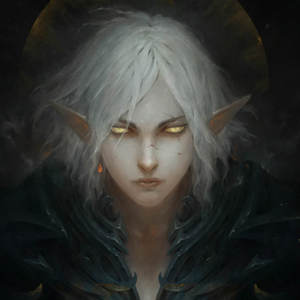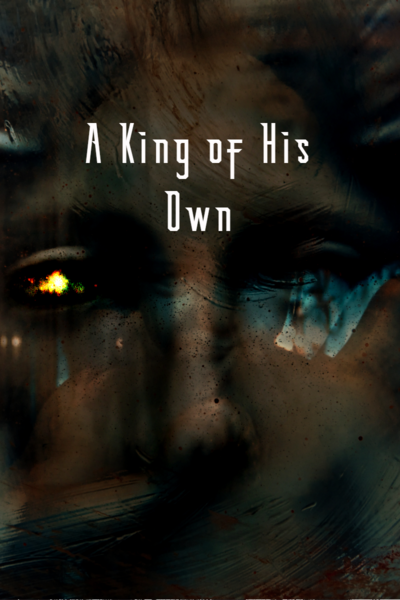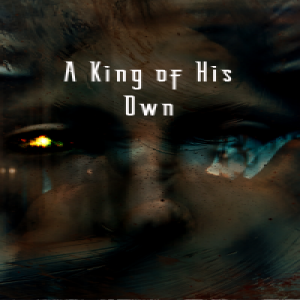In the main hall of the chateau, the Sarkanians hosted a dinner that passed uneventfully. Almost thirty people attended, from Sarkanian knights who had distinguished themselves in the previous battle to the lords and commanders of the army. Prince Arian, Sir Anselm, Lord Wulfsurd, Lord Colbert and Duke Gray were amongst them, as were a few Lavellan nobles who lacked the shame that kept their king in isolation.
They joked and laughed, ate hogs that had roasted over an open fire and drank fine Lavellan wine. They discussed battles and knightly virtues, and shared stories of home. Whenever the discussion took too far a political turn, Wulfsurd would clear his throat and bang his fist on the table like a gavel to put a stop to it, and Arian would concur with princely authority.
At one end of the hall a door was opened, and in stepped Caden. For the first few seconds of his presence he was paid no heed, but as one by one they noticed they stopped speaking and watched him cross the room to the far end of the table. Their eyes were piercing, watching, and very few of them understood how or why Caden was still alive… Or why his eyes were now white, like those of a mountain wolf. Yet he was their prince, the heir to a throne that now lay empty and waiting for him to take it, and they treated him with the respect of a king.
“Have you seen Ethelyn?” Caden asked his brother, his voice low as he leaned over the table.
“No. She’s taken a guest room in one of the northern towers, that is all I know,” Arian replied.
“And hopefully she stays there,” quipped Wulfsurd.
Caden cast a glance over to Harik but did not respond to him. “And what of Armand’s daughter, Lady Jaqueline?” He asked them. “Where is she? Has she eaten?”
“I do not believe so,” Sir Anselm said, bringing Caden to realize that he had not spoken to the man in days. “I did need to speak to you about her, lord. She has taken over an entire wing of the chateau, and her ladies in waiting guard it far more fiercely than the kingsguard. We have left them there for now to avoid unnecessary conflict.”
There was a chuckle, but Caden merely stood back and straight. “Let her keep it if she feels safe there. This is her home after all, and we are not exactly welcome visitors,” Caden replied.
“No, but she must learn that she cannot simply lock away an entire portion of the chateau simply for the sake of her ladies,” said Gray, which caused Wulfsurd to laugh.
“I don’t know, Lord Gray. Some of our own men here have a voracious appetite for women, and indeed some of our lords have the same,” said Wulfsurd.
“Do not be juvenile, Lord Wulfsurd,” Gray replied.
Caden looked around the table for a clean, empty platter and took one, then began to fill it with meats, bread, cheeses and vegetables. “I will take her some food as an offering of peace,” said Caden. “I will not have the lady, or indeed her ladies, lock themselves away both hungry and scared.”
“Shall I come with you?” Wulfsurd asked, already brushing himself down and preparing to stand.
“No thank you, Harik. Not to belittle your extraordinary eloquence and skill with high born ladies, but I fear you’d terrify them into locking their doors permanently,” said Caden. The lords nearby laughed, and Wulfsurd slumped back down in his chair in embarrassment.
“Then at least take someone else to guard you,” pleaded Wulfsurd. “A maid with a dagger is still capable of killing a king.”
“Not me, I fear,” said Caden as he held the platter in one hand and took a full bottle of corked wine with the other. “A knife couldn’t finish me the last time, and I believe they’re averse to repeating mistakes.”
Caden turned then, walking away from the table with his hands full of food and drink. He made his way back across the dining hall, then slipped out of an open side door and into a candle-lit corridor beyond.
He walked through the chateau in silence, giving unusual care into taking in his surroundings. The Sarkanians had not been there long, a few hours at most, but Caden knew the importance of learning the structure by heart. Caden may have subtly guided Armand into doing what he had wanted, but the King of Lavell was by his nature a crafty fox. Those next few days and weeks would be filled with plots and schemes, and Caden had to notice if even the smallest thing was out of place.
Eventually he came upon an empty hallway with a set of double doors at the end that led into a wing of the palace once reserved for guests. Caden found it somewhat incongruous that Armand kept his guests in a place with only one entrance, and considered how Armand was as much wary of plots as he was keen to enact them. Still it was a natural place for Armand’s daughter and her maids to take refuge, for they were as safe as they were trapped. It would not be easy to open that door from the outside, and Caden could only hope they had not yet gone as far as to barricade it.
He approached the door carefully, placing the bottle of wine down on a small round table and then rapping above the handles with his knuckle. There was no answer. He rapped again, louder this time, and thought he could hear something on the other side moving around as though feet were shuffling on a rug.
“Hello?” He called to the door. “I am Caden Sarka. I wish to speak to the lady Jaqueline, and I bring her food and wine as an offering of peace.”
Several people began to whisper then, their words muffled by the door. Caden tried to make out what they were saying but knew he would not hear what they did not want him to. “Hello?” He called again. “I am alone. I do not wish to cause trouble or harm.”
More whispers, then the sound of something wooden being dragged. Then he heard a satisfying click, as though a lock had just been opened by a wrought iron key, and stepped back as the door was pulled slightly ajar.
A young woman’s face appeared in the opening, and with brown eyes she looked at him. “Prince Caden,” she spoke in a thick Lavellan accent, “the Lady Jaqueline wants assurance that neither she, nor her maids, ladies in waiting or other servants shall be harmed or otherwise touched by your soldiers.”
“She has it,” Caden replied, then gestured around himself. “I have come alone. There’s no-one here but me, and I do believe I have neither the strength nor the libido to act in a manner beneath my station.”
The girl’s face stared at him unamused, then she stepped away and pulled the door further open until Caden could see several maids in dresses and work gowns standing in the hallway between the guest rooms.
Between them stood the Lady Jaqueline, her pale hands crossed softly over the front of an expensive but tight-fitting dress of golden brown. It was no ball-gown or ceremonial garb, but rather the kind he might expect her to wear in the comfort of private company. His eyes ran up the dress and to her neck, around which she wore a delicate silver necklace, and then came to a stop over her face.
She was beautiful, her lips full and red and her cheeks so very lightly freckled. Her eyes were blue, like her father’s, but whereas Armand had short blonde hair, Jaqueline’s hair was brown and fell past her shoulders. Her hair was not quite plait, and had golden ribbons weaved gently into it, and he followed them down to where her hair fell over the curve of a breast that was far fuller than last he had seen her. He smiled at her, but she did not smile back.
“Lady Jaqueline,” he greeted with a gentle bow, the platter of food balancing on an outstretched arm. “How many years it has been since last we spoke. I thought you might be growing hungry, and so I have brought you some food.”
Jaqueline looked at him but stayed perfectly composed. “Lord prince,” she greeted him, slightly lowering her head as she did so. “I thank you for your thoughtfulness, but alas I do not feel like eating.”
“For your ladies, then?” Caden asked her, setting the plate down on one of the tables. “And there is a bottle of wine just outside the door.”
“They may eat if they wish so,” Jaqueline agreed, and suddenly two of her maids moved to the plate to take small pieces of food. Another went outside to get the wine, then returned with it in hand. Jaqueline suddenly raised a hand to the wine, causing the lady who carried it to pause mid-step. “Is the wine poisoned, Prince Caden?”
Caden looked disappointed by the accusation and shook his head. “It is not,” he assured her. “Why would I deliver poisoned wine? What reason would I have to harm you or your servants?”
“You are our conquerors, are you not?” Jaqueline replied. “Our invaders. Foreigners in this chateau not by invitation, but by victory in battle and my own father’s enslavement.”
Caden stopped for a moment, then shook his head. “I did not wish for this, Lady Jaqueline. Events have transpired beyond my control, and now that my father is gone it falls upon me to deal with their consequences.”
Jaqueline looked into Caden’s eyes. “King Valen has died?” She asked him, pity in her voice.
“He has.”
“Follow me, Prince Caden. There is a lounge nearby where we may talk in private.”
Lady Jaqueline turned around slowly, then began to walk through the guest wing until a set of doors on one side of the corridor opened into a lounge area with several tables and chairs arrayed around a central fire piece built into the far wall. Like most rooms and corridors in the chateau it was lit by candlelight, though there was enough in the room to prevent it from being dim.
“Please stay outside, and do not listen,” Jaqueline told her maids, who curtseyed to her and then stepped aside. Caden followed the princess past them, though he had a feeling there were quite a few more of Jaqueline’s maids and ladies than he had been shown. Hiding in the guest rooms most likely, the lady they served offering herself to plain view so that they might go unnoticed.
The two entered the lounge and Jaqueline took a seat on one of the sofas, with Caden joining her in a chair opposite. They were silent for a moment; each taking time to try and find in the other changes that had occurred since the last time they had met. Jaqueline was nineteen, just over two years younger than Caden, but when he had been just fifteen the two had spent time together; courting innocently in the palaces of their fathers. At that time, she had been the closest thing he had experienced to love, at an age where love was both everything and misunderstood. He could not help but wonder if some of it had remained, even if their romance had never progressed beyond childhood notions of infatuation.
“What has happened to your eyes?” Jaqueline asked.
Caden blinked for a moment. “They are… Different,” was all he could think to say.
“I know that, Prince Caden. But why? What happened to the green eyes that I once admired?”
“Eyes change, Lady Jaqueline. Innocent eyes become hardened by death and war, cold eyes become warmed by love and fulfilment. Sad eyes become happy. Happy eyes become sad.”
“But green eyes cannot become white eyes, Caden. Summer eyes cannot become winter.”
“Mine can. They have.”
Jaqueline sighed and shook her head, and decided to change the direction of their conversation. “How is your brother? Is he well?”
“He is,” Caden said. “He’s here.”
“That’s good. You were always close,” Jaqueline said with a smile, though it soon disappeared again. “I am sorry about your father, Caden. I truly am.”
Caden lowered his eyes. “It is the risk we take when going to war,” was all he could think to say. “Though I will not pretend that I do not desire vengeance.”
“Against whom?” She asked. “My father?”
“My brother tells me that your father is to blame.”
“… My father has many qualities, Prince Caden, and few of them are good. It is not befitting a king to kill another king, but somehow I can believe that mine still would.”
Caden looked up at her again. “It is not my plan to harm him, Jaqueline. We will negotiate for peace, and once an agreement is reached, we shall leave. This war can be put behind us.”
“And what will it cost the people of Lavell?” Jaqueline asked. “How much of their dignity, their treasure, will they be expected to spend on peace?”
“Only you.”
“Me?” Jaqueline asked, very slightly tilting her head.
“Soon I will be crowned king of Sarkana. Your father has offered you to me in marriage. The cost of peace will be our union.”
Jaqueline took in a deep breath and shook her head the smallest amount, her eyes closing. “So, my father would sell me to save his crown,” she surmised. Caden could not tell if she was angry or disappointed, but it was not long until he realized she was likely both.
Lady Jaqueline of Lavell had always been known for her strong temperament and sense of independence. She had yet to agree to marry, despite her many suitors, precisely because she despised the idea of being treated as a commodity. Her father had respected that wish for several years, especially since the death of her older brother, but it seemed that Armand no longer had a choice.
“The politics are beyond either of us,” Caden told her. “I must do this not only for my sake, but for the sake of the kingdom my father leaves to me. Your father must do the same. Our marriage provides peace, legitimacy, unity and friendship between nations. I cannot simply ignore that for your sake.”
“None of this makes sense, Caden. Our nations are at war, our armies have fought, our men have died. You have fought against Lavellan knights, and my father has fought against your own. All of this has happened, and is happening, and will happen for a reason: sovereignty. You would make the war we have fought mean nothing, solely to make me your wife? You would give my father back his crown, when you could simply take his head and that crown with it?”
“If I killed your father and took your country, the people would never accept it. They would call me a thief, a kingslayer, a usurper. Our marriage would make such an action legitimate… Legal. I would become king not because my father’s army won a battle, but because I became one with the beloved Lady of Lavell.”
“And was that your plan all along, Caden? To beat my father in battle, to imprison him and force him to marry me to you?”
Caden went silent for a moment, then stood and walked towards the fire to warm himself. His form cast a large shadow across the room behind him, and Jaqueline sat in it and waited for his answer. “I don’t know what my father was planning,” Caden lied. “We argued about this war. I did not agree with it.”
“Yet it seems to have worked out well for you,” Jaqueline said.
“And what would you have me do, Jaqueline? Go home with nothing? Start my rule by telling the people who look to me for leadership that the deaths of their loved ones, of my father, were for absolutely nothing? I cannot.”











Comments (0)
See all